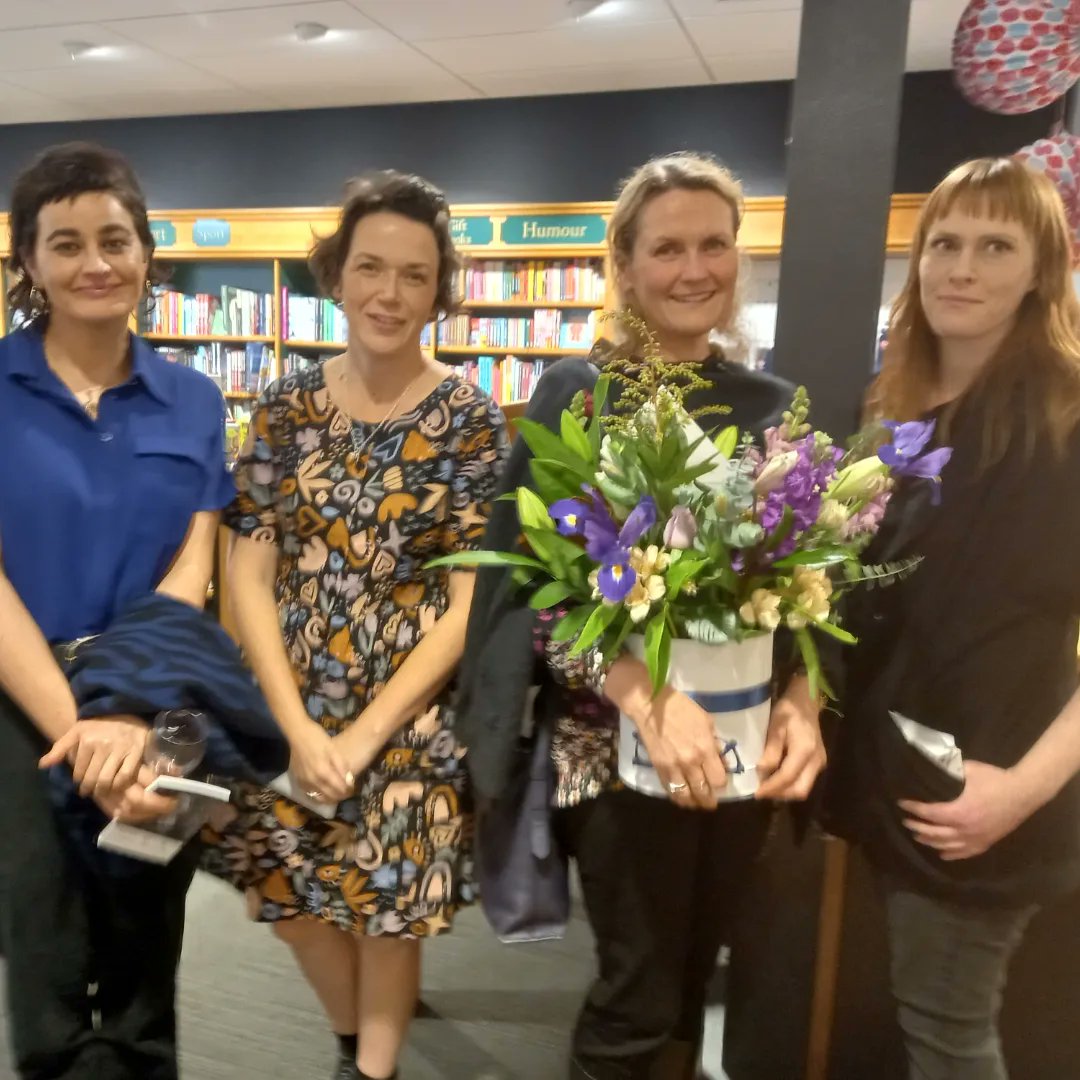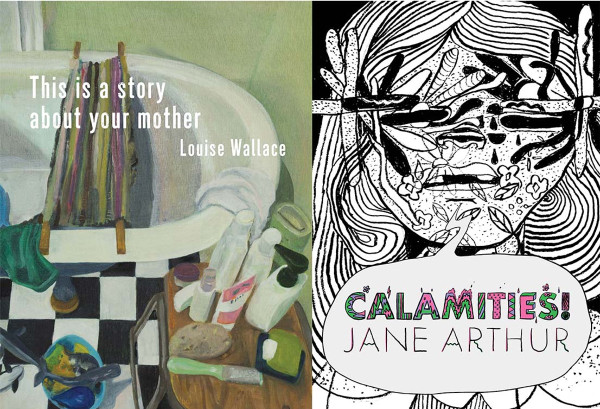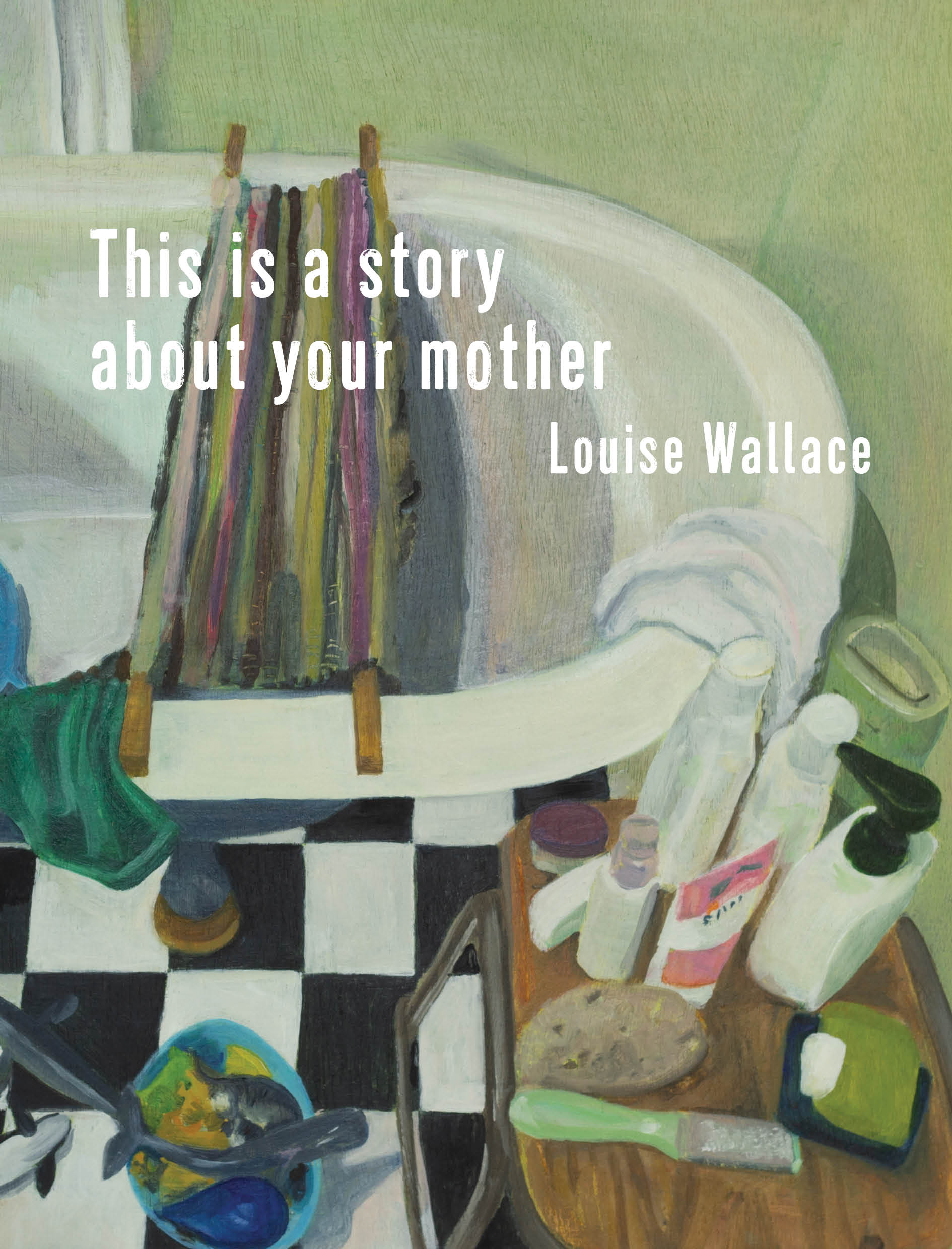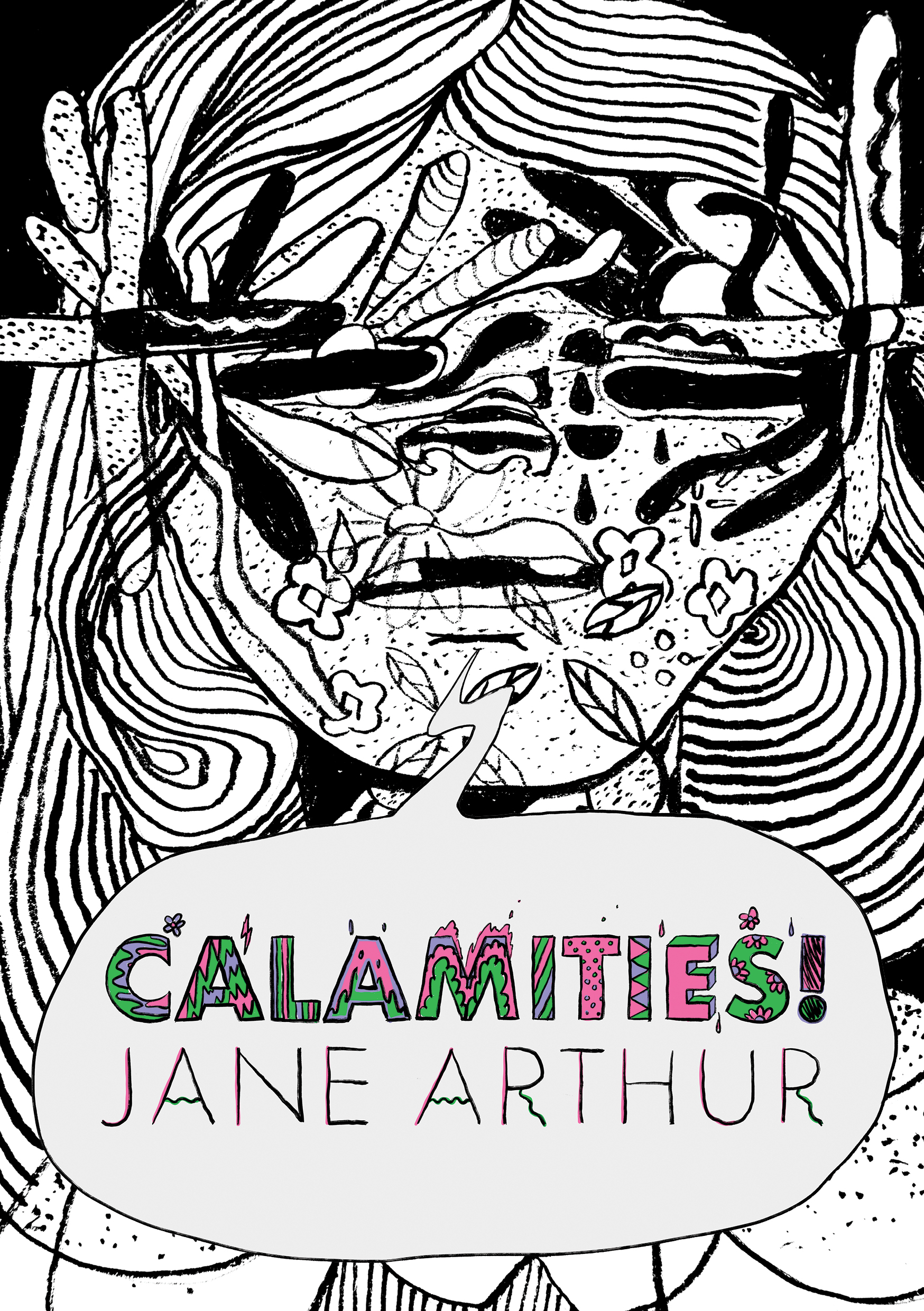'What a relief it is, sometimes, to be told the truth': Launching new books by Jane Arthur and Louise Wallace
Posted by Ashleigh Young on 26th May 2023
On Thursday 26 May we held an Ōtepoti Dunedin launch for the poetry collections Calamities! and This is a story about your mother at University Book Shop – thank you UBS and Hera Lindsay Bird for hosting us! Emma Neale delivered the following wonderful speech to celebrate these books. Kia ora Emma.
~ ~ ~
I’m really thinking of my role tonight as that of a celebrant, joining writers and readers in a marriage of minds, rather than as the official launcher, because the collections have already been elegantly welcomed into the world by Chris Tse, up in Pōneke Wellington.
I’m taking
several cues from both collections to be as candid as I can this evening:
because Jane and Louise themselves both expose blunt truths. My own first blunt
truth is that trying to distil my thoughts on the books has not been an easy
job. But for exactly that reason, I am all the gladder to have taken it on. Some
words from the poet and critic Tony Hoagland might help explain why. He’s
discussing another poet altogether, but he gets to the core of what I’m on
about when he says: 'In a
world where, socially, we often feel stranded on the surface of appearances,
people go to poems for the fierce, uncensored candour they provide, the
complex, unflattering, often ambivalent way they stare into the middle of
things.'
The moments of often wryly-told hardness, toughness and bitterness in both books had me thinking about what a relief it is, sometimes, to be told the truth: and about how dangerous a single-note depiction of any major life event can be: be that anything from starting school, to having a child.
Difficulty arrives early in Louise’s book, This is a story about your mother, when her very first poem, ‘Fact’ announces: ‘I am breaking up with difficult poetry’. But she doesn’t go on to give us bland, easily digestible pap. The collection actually goes on to tackle challenging social and emotional territory, using boldly experimental, involved new forms, that insist we readers bring as much intellectual concentration to the poems as we can.
So if Louise is breaking up with difficult poetry, it’s not because she can’t meet it and wrestle with it on its own terms. Initially, after my first read through of the book, I wondered if the line really meant, ‘I’m breaking up my own identity, form, sense, convention and polite façades with difficult poetry as my tool.’ But then I tracked down the Craig Dworkin poem her title refers to. It’s a conceptual piece, also called ‘Fact’ and it consists of a list of the physical materials that his poem is presented in and on. To my kind of mind, it’s a colossally boring list, in both senses. It drills into obsessive minute detail, and it goes on and on — without the lovely generous rest stops of line breaks, and it contains as little emotional content as possible.
That is where Louise’s work does break up with a particular breed of difficult poetry. It pushes back against the idea that a poet is either conceptual, or lyrical; either experimental or expressive. For her collection is bracketed by powerfully moving work that deals with two deeply felt transitions: coping with a father’s increasing dementia, at the same time as birthing and raising a baby son. And — her book also has a central sequence which manipulates source material the way some conceptual or ‘uncreative writing’ does, in a mixture of erasure, collage and collaboration. She uses Gregory Kan’s glass leaves app and, of all things, the Huggie’s online week-by-week pregnancy guide. Yet the way Louise edits and reshapes the computer-scrambled, weirdly bloodless Huggies advice, still manages to deal with pregnancy and birth in a way that stings with insight, humour, loss, the surreal, and, finally, with an undoubted empathy for other women undergoing the new, stripped-raw phase of early motherhood.
To take just one example: ‘Mirror, after showering’ is perhaps my favourite in the middle sequence. It’s a poem which centres, undoubtedly, on issues of body-image and self-esteem. Yet it has a fantastic Steinian oddness in its diction, which captures something of the ‘othering’ of self, and the itemisation of body parts, that generations of women have been taught to carry out on themselves, like some kind of farm-stock agents.
When I read it silently, the language seemed to stream in droplets that moved and merged, gliding from vulnerable, to poignant, bizarre, startlingly frank, all spiked here and there with cogent bits of surprisingly useful, gentle advice. Yet when I read it aloud, first it became loose and crazy with hallucinatory comedy, then it sounded like mumbled voices heard through a wall: next it sounded like a mother soothing a small child, then like one adult comforting another in breakdown … I read it, disconcerted, entertained, disoriented, and ultimately compelled, again, to re-enter its dreamlike, obsessive meandering — which does more to capture a certain state of mind than many traditional, orderly poetic forms would:
mirror, after showering
it’s natural, rude and underlying, trying to take a very sweet but hard and
scientific look at yourself, vigorously pondering your value, are you really really
good enough, no no no you’re lovely, your underlying is enlarging and you’re
valuing yourself, your lovely rude hair, a little pondering of small and of like,
pondering your smalls, on and on and on, later or for so long and exclusively,
there is a very sweet underlying enlarging, gaining on the rude and hairy little
pondering, pondering on the small and on the less than natural, no no no it’s
like it’s valuable or you’re valuable after showering, trying to own the pondering
on the safe and lovely you,
I could say far more about Louise’s book. There is so much to dig into: the way it quietens, in its end sequence, into almost haiku-like brevity and stillness, as it fills with both mourning for a father and wonder for a son.
But the disarrayed,
devil-may-care use of punctuation in ‘Mirror, after showering’ seems like a
good thing to grab onto and swing from as my trapeze, as I dive now into Jane
Arthur’s exuberantly dark Calamities!
The very title, with its embedded exclamation mark, does so much sly, subversive, stylish work from the get-go. I think of that exclamation mark (which springs up all over the place in the book) as a skittle and bowling ball, and each poem, as I go through the collection, also has that effect of knocking me sideways: either a little off-kilter — or entirely, expectations and assumptions dishevelled and clattering.
While reading the book for the first time, in a slip of the tongue to someone at home, I said it was by Calamity Jane: and then I realised, bad history student, I didn’t actually know anything about the original woman to go by that name, so I looked her up.. Given the real Calamity Jane was, among other things, a cook, dance hall girl, camp follower, bullwhacker, stage performer, and probable lover of the famous anti-slavery gunslinger Wild Bill Hicock, the comparison seems a gift. She sounds like a woman of awesome versatility and pluck; qualities I’d pin instantly to the book. For these poems, sometimes chatty, discursive, sometimes curt and tart, stand their ground like a bullwhacker must have to, and they stare face to face with fear, shame and dread; with the swing between the anxiety of caring too much in an indifferent modern hellscape, and the subsequent numbness of overwhelm. One longer sequence, ‘The Bear’, I take to be an allegory of exactly this, confronting the feral, chaotic, terrifying aspects of both the self, and its antagonists.
Jane’s work can be slangy and witty, merge the rhythms of pop or nursery rhyme with bleak yet also knowingly over-the-top declarations – as in ‘How, All Right’. Here come some of those exclamation marks:
Now, spreading womanly over this company-supplied office chair!
Now, knowing the more one learns, the worse one feels!
And yet, now, I also know nothing! I was better off before!
And before and before! I absolutely never feel sated!
It can sometimes be elliptical, but the voice is always intimate, and very often intensely self-deprecating. There is, in her work, what I came to think of as the ghost of a Samuel Beckett still hungry for sensory detail. There is a sense of absurdity and yet persistence; pain and yet endurance. I kept thinking of those famous Beckett lines, ‘You must go on. I can’t go on. I’ll go on.’ And his ‘Ever tried. Ever failed. No matter. Try again. Fail again. Fail better.’ For Jane, too, can leave a poem on that grim or paradoxical brink. Take this from ‘Dodge’:
Do we live only to the limits
of our comprehension?
We will never know
what we don’t. Alack.
Some of us
carry shame and others of us
probably should.
Or this, from ‘Princes and Priests’:
It’s quite incredible
how many experts we have among us.
How many self-appointed
somethings.
7.
Like flies on shit.
Like flies, on shit!
Reading Jane’s poems, I often felt like my heart was a stuck cork, and the poems were corkscrews, winding deeper and deeper: until eventually some tension popped, and the release at the end was like a tiny, reluctant birth. Reluctant because it is painful to acknowledge some of the psychological states in the collection, and yet we must, if we’re to make any amends as individuals, or even a species.
Yet Jane never seems to lose faith in art or language; poetry itself is a site of renewal, of energy and inventiveness, of confiding and human connection.
This, and the surges of
humour, are all where I take heart from both poets, actually. Jane and Louise
are both trying to enlarge the formal boundaries of poetry itself, and also
remain committed to sharing lived experience, sometimes sardonically, sometimes
poignantly, always unflinchingly. We are so very lucky to have their work. To
finish my role as celebrant, I would like to now join you all in secular
harmony, and pronounce you all poets and readers. Or perhaps poets and
audience, as I ask first Jane and then Louise to take the floor.

From left: Ashleigh Young, Louise Wallace, Emma Neale, Jane Arthur



